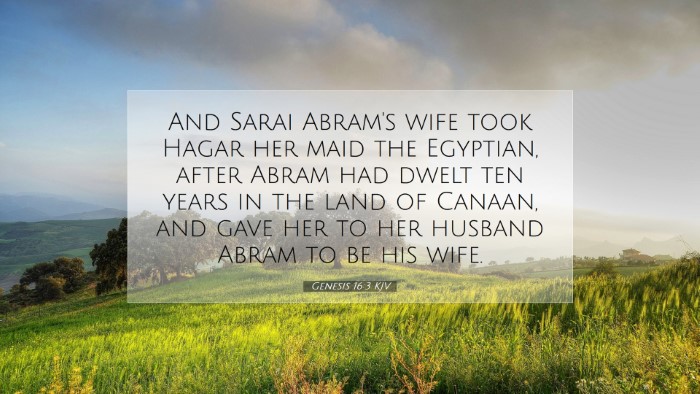Commentary on Genesis 16:3
Bible Verse: "And Sarai, Abram’s wife, took Hagar her maid, the Egyptian, after Abram had dwelt ten years in the land of Canaan, and gave her to her husband Abram to be his wife."
Introduction
This pivotal verse in Genesis introduces a significant moment in the lives of Abram (later Abraham) and Sarai (later Sarah), which sets the stage for profound theological implications regarding faith, human agency, and divine promise. In examining this passage, we draw insights from prominent public domain commentaries, analyzing the actions and motivations of Sarai and Abram, as well as the implications of their choices.
Sarai’s Use of Hagar
Matthew Henry's Commentary: Matthew Henry emphasizes the desperation of Sarai as she seeks to fulfill God's promise of offspring. He notes that her decision to give Hagar to Abram reflects a lack of faith in God's timing, leading them to a scheme that ultimately causes strife. Henry poignantly remarks, "They doubted God's promise and therefore took this step." This illustrates a common theme in the biblical narrative—human impatience with divine timing.
Albert Barnes' Notes: Barnes provides a historical context, pointing out that the customs of the time permitted a man to take a secondary wife when the first wife was unable to bear children. He explains that the cultural norm might have led Sarai to believe this step was justifiable. However, he cautions against interpreting cultural practices as divinely sanctioned, noting that Sarai’s actions reflect a significant lack of trust in God’s plan.
Character Analysis
Adam Clarke's Commentary: Clarke provides an insightful character analysis, noting the complexities of Sarai and Abram’s situation. He identifies Sarai's motivations rooted in societal pressure and personal pain, stating, "Sarai, in her grief, acts rashly, yet she reflects the anguish many women bear." Abram's compliance with Sarai’s request is seen as a failure of leadership and spiritual discernment. Clarke urges readers to consider the ramifications of their actions on the relationships they hold dear.
Theological Implications
Exploring the theological ramifications, we observe a profound lesson regarding the interaction of divine sovereignty and human free will. As Henry suggests, "The steps taken by Sarai and Abram teach us that impatience in waiting for God's promises can lead us to sinful decisions." This tension raises significant questions for theologians regarding predestination and human responsibility.
Hagar's Role and Significance
Insight from Matthew Henry: Henry enlightens the role of Hagar, noting that she becomes a central figure in the unfolding narrative of the Abrahamic covenant. While perceived as an instrument in Sarai's plan, Hagar’s subsequent treatment and the birth of Ishmael lead to serious consequences, emphasizing the weight of moral choices and their far-reaching effects.
The Effects of Sin
Albert Barnes' Commentary: Barnes highlights the immediate effects of this union—Hagar’s conception leads to jealousy and strife between the women. He observes, "What was intended as a solution only compounded the problems." The insights from this commentary remind us of the often painful consequences that arise from deviating from God’s ordained path.
Lessons for Today
In reflecting on Genesis 16:3, contemporary readers are invited to consider the implications of their own impatience and the temptation to take matters into their own hands. This narrative serves as a cautionary tale for pastors and leaders to encourage their congregations to uphold faith in God’s timing, urging trust in His promises despite visible delays.
Conclusion
Genesis 16:3 encapsulates a moment of human fallibility, where the interplay of culture, impatience, and a desire for control intertwines with God's overarching narrative of redemption. As we study this verse in light of the commentaries from Henry, Barnes, and Clarke, we gain invaluable insights into God’s faithfulness amidst human shortcomings.
In conclusion, let us heed the lessons drawn from this passage: to trust in the Lord's timing, to reflect on the consequences of our decisions, and to embrace the steadfast promises of God which shall ultimately prevail.


